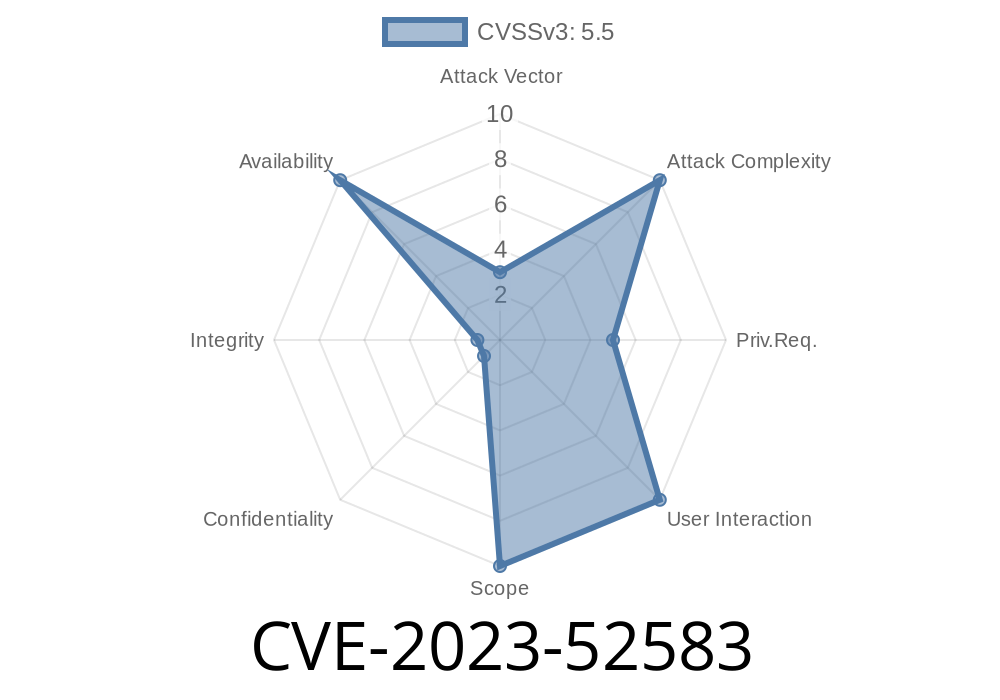CVE-2023-52583 is a vulnerability that was resolved in the Linux kernel, specifically impacting Ceph filesystem support. In this post, I'll break down what happened, how the problem occurred, and show actual code snippets for deeper understanding. You'll also find links to original references and a simple explanation with exploit analysis.
What is CVE-2023-52583?
This vulnerability is found in the Linux kernel’s implementation of the Ceph distributed filesystem. The issue is a result of misusing the dget() function, leading to a wrong order of locking between a directory entry (dentry) and its parent, which can result in a deadlock or just unused code (deadcode).
Understanding the Problem
The function dget() is used on directory entries (dentaries) in the Linux kernel to increment the reference count, ensuring the entry isn't deleted while being accessed. For filesystem operations, maintaining the proper order of acquiring locks between a dentry and its parent is absolutely crucial to prevent deadlocks.
In Ceph, a code path existed where the lock acquisition order wasn't guaranteed. This could either end up never being executed (deadcode) or, in certain rare conditions, trigger a deadlock between the dentry and its parent.
The Buggy Code
The problematic code looked like this (roughly, source: commit patch):
struct dentry *parent;
if (!parent) {
parent = dget_parent(dentry);
// ...
}
// Some operations
dput(parent);
Here, dget_parent() could acquire the parent lock after child, violating the needed order. In practice, the parent *should always* be propagated from the caller, making these lines unused (deadcode).
The Fix
The maintainers decided the safest and cleanest solution was removing that entire conditional block. The revised code simply assumes the parent is always set by the caller, keeping the order intact:
// 'parent' is always set properly by the caller
// Dead code removed - bug fixed by deletion
What Would Exploiting This Look Like?
*If* the deadcode was ever reached and the improper lock order occurred, a local attacker could possibly cause the kernel to lock up (deadlock). This would typically require triggering tricky filesystem operations on Ceph mounts, prodding rare races in the code.
Proof of Concept (PoC)
Creating a deterministic exploit for a lock order bug like this is extremely difficult—it’s timing dependent, and needs careful arrangement of Ceph dentry references. The usual approach in vulnerability research would look like:
// Pseudo-PoC: Multiple Ceph dir operations in parallel can hit deadlock
// Thread 1
open("/mnt/ceph/dirA/file1", ...); // Triggers dget() on dentry
// Thread 2
rename("/mnt/ceph/dirA", "/mnt/ceph/dirB"); // Acquires parent lock
// Race between thread order can (very rarely) trigger deadlock
In reality, hitting the bug condition is so rare that deadlocks have not been commonly reported in the field. But, as per kernel standards, even unreachable race conditions are fixed if they might cause a system hang.
Who is affected?
+ Anyone running Linux kernels with Ceph module, before this patch, is technically at risk (though practical risk is close to zero).
What should you do?
+ Update to latest Linux kernel where the fix is merged.
References
- Kernel.org Patch (Removes the deadcode)
- CVE Record - CVE-2023-52583
- Ceph Filesystem Documentation
Conclusion
CVE-2023-52583 is a great example of how the Linux kernel community routinely fixes even theoretical bugs that could affect stability. In this case, the best fix was to *remove unused, problematic code*. While the odds of hitting this bug were low, resolving it makes the kernel ecosystem safer and more robust for everyone.
Timeline
Published on: 03/06/2024 07:15:06 UTC
Last modified on: 02/03/2025 14:18:13 UTC
